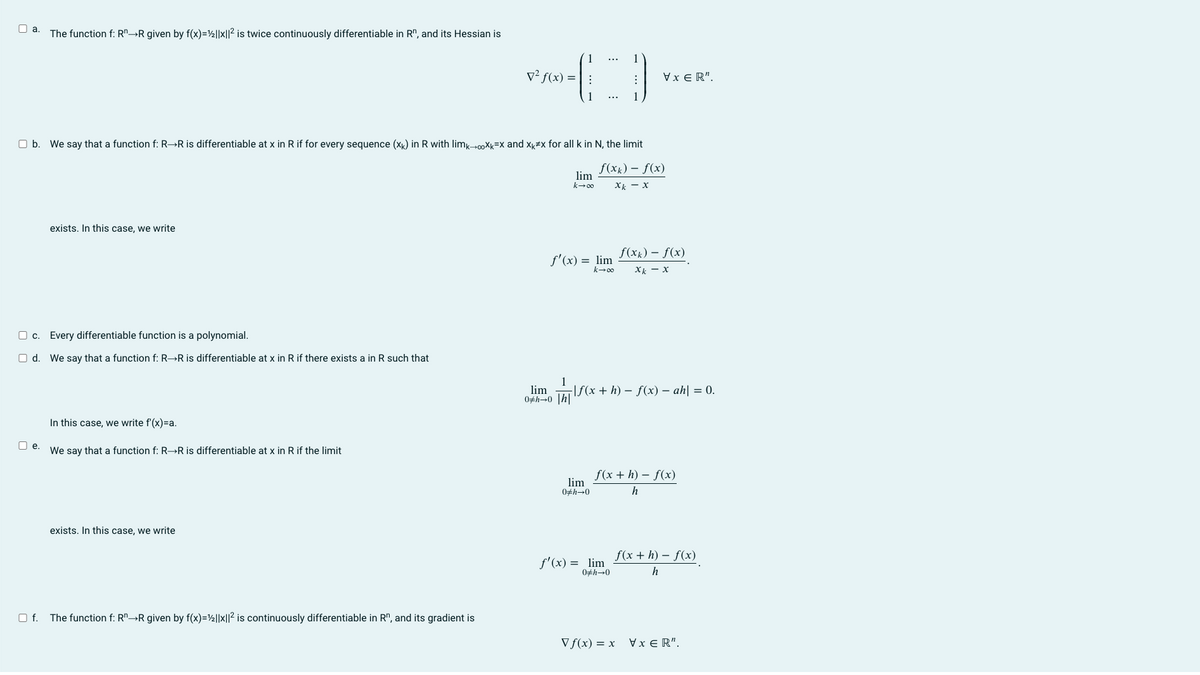a. The function f: RR given by f(x)=x² is twice continuously differentiable in R", and its Hessian is v² f(x) = VxER".
a. The function f: RR given by f(x)=x² is twice continuously differentiable in R", and its Hessian is v² f(x) = VxER".
Algebra & Trigonometry with Analytic Geometry
13th Edition
ISBN:9781133382119
Author:Swokowski
Publisher:Swokowski
Chapter5: Inverse, Exponential, And Logarithmic Functions
Section5.3: The Natural Exponential Function
Problem 52E
Related questions
Question
100%
Which of the following statements are true?

Transcribed Image Text:a.
The function f: R→R given by f(x)=12||x||² is twice continuously differentiable in R", and its Hessian is
exists. In this case, we write
c. Every differentiable function is a polynomial.
Od. We say that a function f: R→R is differentiable at x in R if there exists a in R such that
Of.
b. We say that a function f: R→R is differentiable at x in R if for every sequence (xk) in R with limk-ooXk-X and xk*x for all k in N, the limit
f(xk) - f(x)
xk x
In this case, we write f'(x)=a.
☐e. We say that a function f: R→R is differentiable at x in R if the limit
exists. In this case, we write
v² f(x) =
The function f: R→R given by f(x)=½||x||2 is continuously differentiable in R", and its gradient is
lim
k→∞o
lim
0#h→0 |h|
3
f'(x) = lim
lim
0#h→0
⠀ VxER".
-\f(x +h) − f(x) – ah| = 0.
f(xk) - f(x)
k→∞o Χk - X
f'(x) = lim
0#h→0
f(x +h)-f(x)
h
f(x+h)-f(x)
h
Vf(x)=xVxER".
Expert Solution
This question has been solved!
Explore an expertly crafted, step-by-step solution for a thorough understanding of key concepts.
Step by step
Solved in 3 steps

Recommended textbooks for you

Algebra & Trigonometry with Analytic Geometry
Algebra
ISBN:
9781133382119
Author:
Swokowski
Publisher:
Cengage

Linear Algebra: A Modern Introduction
Algebra
ISBN:
9781285463247
Author:
David Poole
Publisher:
Cengage Learning


Algebra & Trigonometry with Analytic Geometry
Algebra
ISBN:
9781133382119
Author:
Swokowski
Publisher:
Cengage

Linear Algebra: A Modern Introduction
Algebra
ISBN:
9781285463247
Author:
David Poole
Publisher:
Cengage Learning


Elements Of Modern Algebra
Algebra
ISBN:
9781285463230
Author:
Gilbert, Linda, Jimmie
Publisher:
Cengage Learning,

College Algebra
Algebra
ISBN:
9781305115545
Author:
James Stewart, Lothar Redlin, Saleem Watson
Publisher:
Cengage Learning